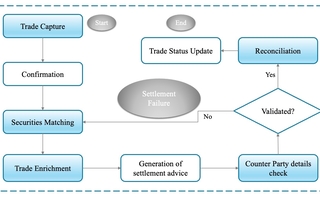SS&C Advent is working towards its cloud evolution
Three years after laying out its cloud roadmap, the vendor is still pushing ahead with the Genesis platform as the foundation.

These days, developments among capital markets tech vendors typically include a melting pot of focus areas: artificial intelligence, Big Data, and the cloud, just to name a few. In the case of the latter subject, the last five years have seen a variety of vendors across the industry move toward cloud-native tools as their end users’ tech appetites change.
In 2020, SS&C Advent laid out the steps it would take to move its suite of solutions to a cloud-native model. Underpinning the buy-side specialist is the Geneva portfolio management system, the Moxy order management system, the APX client management solution, and Genesis, the company’s portfolio construction and rebalancing offering.
Advent was looking to offer an entire suite that is cloud-based, whether that meant building additional cloud-native capabilities, or transforming legacy solutions to be able to plug-and-play with a much more open cloud platform. “This would be a multi-year endeavor, but we’re starting by building off what we already have with Genesis, and extending that,” Karen Geiger, co-general manager at SS&C Advent previously told WatersTechnology.
Three years later, she says the vendor is still on the same path with the vision it set out in late 2020. And, the basis of that will be the Genesis platform.
Genesis is the only platform of the four mentioned that is cloud native. Geiger describes Genesis as a data-centric platform upon which other platforms can be built. Recent expansions to the platform include Genesis portfolio management, which does rebalancing and order creation. A second capability, called Genesis portfolio analysis, offers insights and decision support for the front-office, and is currently in beta testing.
“Those are the first solutions that are available in the market, but really, what we’re doing is [creating the] underpinnings of that to serve as the framework and platform upon which those other best-of-breed solutions can eventually make their way into this front-to-back platform,” Geiger says today. The overall Genesis platform is designed to be flexible and scalable, to accommodate complex preferences and restrictions. It can also performe analytic workflows that allow users to analyze, understand, and explain their exposure, as well as the drivers of performance across thousands of accounts.
Switching to the cloud and shifting away from legacy, engrained systems to that environment is not an easy task. Geiger says that portfolio accounting systems like Geneva are the hardest to switch. To navigate that eventual entry into a cloud platform, Advent is offering cloud-based front-office solutions that can be adopted without an accounting system migration. “What we’re offering with plug-and-play is it can work with your existing portfolio accounting system,” Geiger says. “And that is something that we’ve seen really works with our large enterprise clients.”
Advent’s outsourcing business could offer them an advantage in moving to cloud-native offerings. Steve Leivent, Geiger’s co-manager counterpart at Advent, had acknowledged in 2020 that outsourcing could serve as a bridge to that transformation. At the time, around 90% of new sales for SS&C Advent had some degree of hosting and outsourcing services.
Today, Geneva and APX, in particular, are getting the most interest in outsourcing, Geiger says. “In the back office, we are seeing many firms exploring what their software provider can do for them in terms of managed services,” she says. That has also extended into operational services like daily data management, downloads from custodians and third parties, and reconciliations.
Other approaches currently being supported include hybrid deployment models where on-premise solutions like Geneva and APX can “talk” to cloud platforms like Genesis, SS&C Eze Eclipse, and Advent’s wealth platform, Black Diamond.
The buy-side’s appetite for cloud-based tools have grown over the last few years. Traditional single-tenant deployments establish an entry point but eventually, a user should not be able to recognize whether they’re existing in a single- or multi-tenant environment because the offering is the same. “The market has gotten savvier about the level of due diligence that is required around security and what the measures and protections taken around managing an environment are.” Ultimately, multi-tenant is the way forward, Geiger says.
SS&C Technologies bought Advent Software in 2015 for $2.7 billion. Vinod Jain, senior analyst at Datos Insights (formerly Aite-Novarica), says the offerings underneath SS&C Advent have either been acquired, customized, or homegrown, or a mix of both over a period of time. “Each of them are operated independently, because they’re catering to a specific business function being done by the buy-side firms,” he says. “How those buy-side firms were adopting that particular piece of software was completely in their own set up as a mix of everything together,” Jain says.
Optionality is ultimately one of the drivers of this cloud evolution, with the understanding that a user may not want to utilize all that is offered in the platform, Geiger says. “Our goal is to have something that can take data, whether it’s from our own solutions, or from other solutions that might be in a customer’s ecosystem, and surface them up into the specific business needs of the client,” she says.
This strategy can be seen in Advent’s relationship to SS&C Eze, another unit under SS&C Technologies that offers investment management software. In 2020, Geiger said that the two teams were working to have a tighter integration. Today, that integration is tighter, with the two organizations sharing a research and development team, product team, sales team, and marketing team.
“Advent was always the best in the back office with our portfolio accounting capabilities,” she says. “And then Eze was always really leading with the front office and the trading capabilities and the connectivity that has been built out over many, many years.” The two are complementary to each other from a market perspective.
“We have many customers that are sort of a hybrid of a wealth manager and asset manager and so they’re looking for front office capabilities that can support wealth management clients, but then their strategies require them to have more depth of asset management,” Geiger says.
The combination of using Genesis’ front-office capabilities with an Eze OMS rather than Moxy would be more appealing to support asset management capabilities, as an example. That combination can then be marketed and powered by the Genesis platform.
Further reading
Only users who have a paid subscription or are part of a corporate subscription are able to print or copy content.
To access these options, along with all other subscription benefits, please contact info@waterstechnology.com or view our subscription options here: http://subscriptions.waterstechnology.com/subscribe
You are currently unable to print this content. Please contact info@waterstechnology.com to find out more.
You are currently unable to copy this content. Please contact info@waterstechnology.com to find out more.
Copyright Infopro Digital Limited. All rights reserved.
You may share this content using our article tools. Printing this content is for the sole use of the Authorised User (named subscriber), as outlined in our terms and conditions - https://www.infopro-insight.com/terms-conditions/insight-subscriptions/
If you would like to purchase additional rights please email info@waterstechnology.com
Copyright Infopro Digital Limited. All rights reserved.
You may share this content using our article tools. Copying this content is for the sole use of the Authorised User (named subscriber), as outlined in our terms and conditions - https://www.infopro-insight.com/terms-conditions/insight-subscriptions/
If you would like to purchase additional rights please email info@waterstechnology.com
More on Emerging Technologies
Quants look to language models to predict market impact
Oxford-Man Institute says LLM-type engine that ‘reads’ order-book messages could help improve execution
The IMD Wrap: Talkin’ ’bout my generation
As a Gen-Xer, Max tells GenAI to get off his lawn—after it's mowed it, watered it and trimmed the shrubs so he can sit back and enjoy it.
This Week: Delta Capita/SSimple, BNY Mellon, DTCC, Broadridge, and more
A summary of the latest financial technology news.
Waters Wavelength Podcast: The issue with corporate actions
Yogita Mehta from SIX joins to discuss the biggest challenges firms face when dealing with corporate actions.
JP Morgan pulls plug on deep learning model for FX algos
The bank has turned to less complex models that are easier to explain to clients.
LSEG-Microsoft products on track for 2024 release
The exchange’s to-do list includes embedding its data, analytics, and workflows in the Microsoft Teams and productivity suite.
Data catalog competition heats up as spending cools
Data catalogs represent a big step toward a shopping experience in the style of Amazon.com or iTunes for market data management and procurement. Here, we take a look at the key players in this space, old and new.
Harnessing generative AI to address security settlement challenges
A new paper from IBM researchers explores settlement challenges and looks at how generative AI can, among other things, identify the underlying cause of an issue and rectify the errors.








